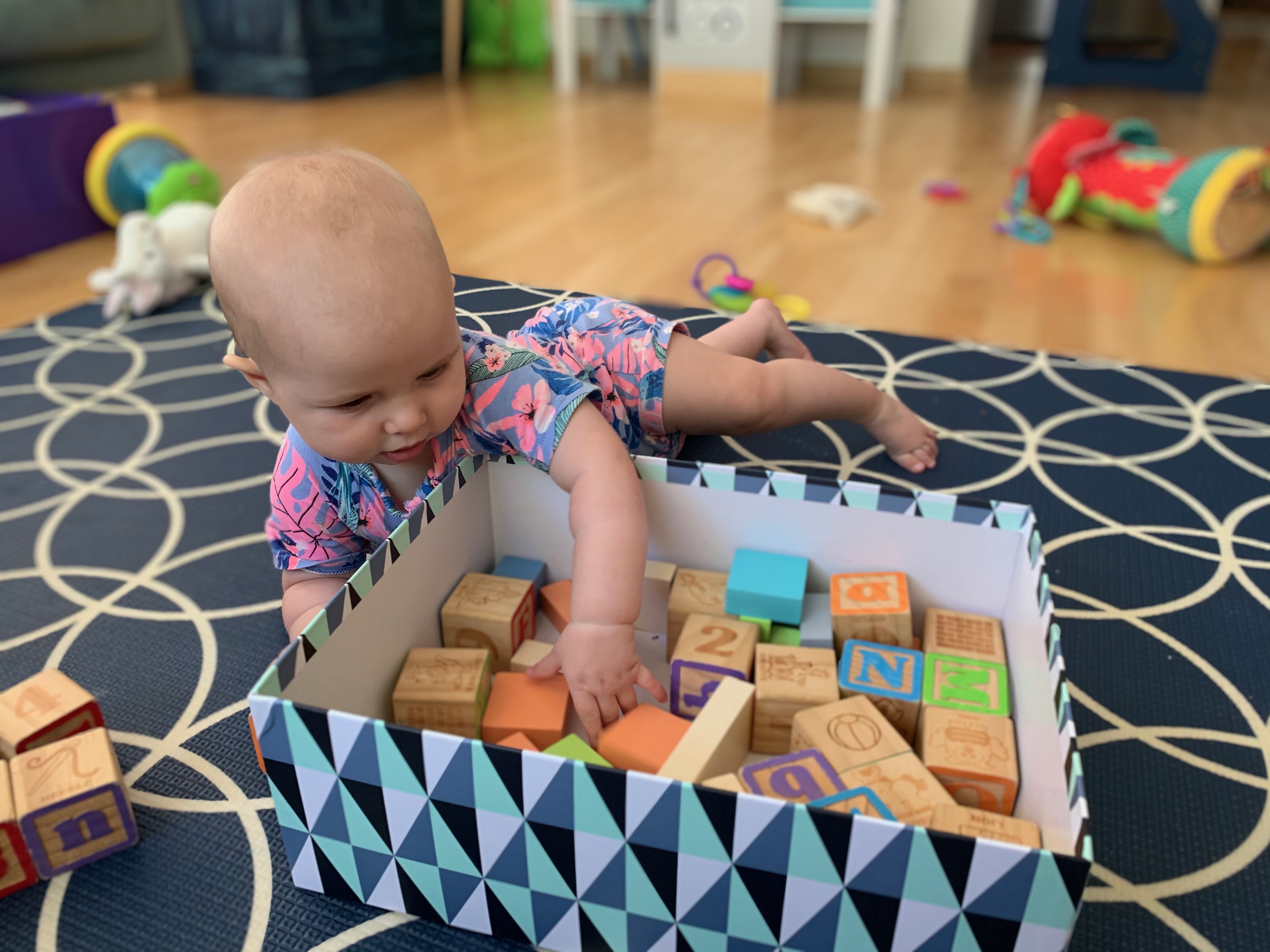Beyond Fun: 5 Ways Wooden Blocks Build Gross Motor & Communication in Young Kids
Aug 19, 2025
Construction play is of course a wonderful way for children to learn about spatial relations and exercise their creativity, but did you know that even before they can build independently open ended construction toys are also great for supporting your baby’s language and motor skills too?
At our Perth therapy services, we often use wooden blocks to help babies and toddlers develop both gross motor and communication skills in playful, engaging ways. Wooden block sets can make family playtime with different age siblings easier as the blocks are too big to pose a choking risk and they are enjoyable for all ages, you’ll just notice the sophistication of building skills varies between siblings. There are endless possible combinations and opportunities and no need for parents to have to help follow complicated instructions.
Simple Play Ideas with Wooden Blocks to Support Gross Motor and Communication Skills

1. Developing Fine Motor Skills with Wooden Blocks
Allowing your baby and toddler free play time with blocks will help them reach the cognitive and fine motor milestones related to construction play. Most babies don’t need support to develop these skills, just give them some space and let them experiment! These mini-milestones show how your baby’s play might change as they grow, and we regularly guide parents in supporting these stages at our Perth therapy hub:
- At 6 months your baby will be able to pick up small blocks
- At 7 months your baby can transfers a block from one hand to the other
- At 9 months your baby will be able to hold a block in each hand and bangs them together
- At 10 months if you play a "Pack away" or "Ta" game and hold out your hand your baby can give you the blocks
- At 11 months your baby will pack blocks in and out of larger containers alone
Toddler construction skills are more variable, between 12 and 24 months your toddler will learn to stack in increasingly more complex ways building taller towers and of course loving to crash them down.
2. Encouraging Communication Through Wooden Block Imitation Games
Did you know that imitation is an important language pre-cursor skill? Babies learn to imitate actions, then sounds and finally words! You might start to notice your baby copying actions from 7-8 months of age. Using lots of actions in play can help your baby notice them and start copying them when they’re ready. In our speech pathology services in Perth, we often use this type of wooden block play to encourage communication skills.
Try grabbing two blocks (and give your baby some too) and banging them together….then PAUSE to see what your baby does. Did they copy you? If not, keep modelling and add simple language to your actions too (‘bang bang!’).
3. Wooden Blocks for Tummy Time Gross Motor Development
Tummy time mobility like creeping and crawling involves your baby leaning on 1 side of the body and reaching forwards with the other (without falling) then swapping to lean on the other side. A basket, or box with low sides filled with objects that are interesting to explore, and safe to mouth, can provide just the incentive your baby needs to practise this movement.
For older walking toddlers, tummy time is still beneficial for strengthening the back and shoulder girdle muscles. At our Perth therapy services, we encourage using wooden blocks in tummy time to support gross motor strength at all ages.

4. Building Early Language with Wooden Blocks and Action Words
Verbs are so important to model throughout your day for your baby to learn because we can’t make a sentence without them! They are also great early words for your baby to learn as they can be used in multiple contexts. Add verbs to your block play by talking about what your baby is DOING. ‘Put on’ ‘Build’ ‘Knock down’ ‘push over’. Repeat them over and over and remember to pause in between to see if your little one copies it!
5. Squat-to-Stand Play for Gross Motor Communication Skills
Around the age they are becoming very interested in “putting in” and “unpacking” many babies are working on their standing balance and getting ready to walk independently. An important pre-walking mini milestone is being able to squat down while holding on with one hand. Creating a play space with something safe to pull up on and having some toys placed high and some low allows your baby to develop this skill. Try a box or basket of blocks on the floor and a few up on an appropriate table. As your baby squats up and down to collect the blocks, possibly to build, or to put them in and out of the box, depending on their age they will be building leg strength and developing standing balance — something we focus on in our Perth therapy services to enhance both gross motor and communication skills.
How to choose the right blocks? Think about what suits your family; the size and safety if you have different age siblings, how durable are they? Are they painted or dyed? Will they cope with some mouthing and throwing? Would very large blocks be potential weapons in your house or would they make the set more appealing to older siblings.
We love the rainbow pyramid block set from JoyKids. There are enough blocks for everyone to play with, we love the different sizes and colours that open lots of options for creative and pretend play. We love the really big size of the middle blocks so we can build giant towers and I don’t have to supervise too closely as they can’t be choked on. Many families visiting our therapy services at Walky Talky Hub in Perth choose similar sets for their versatility and safety.










